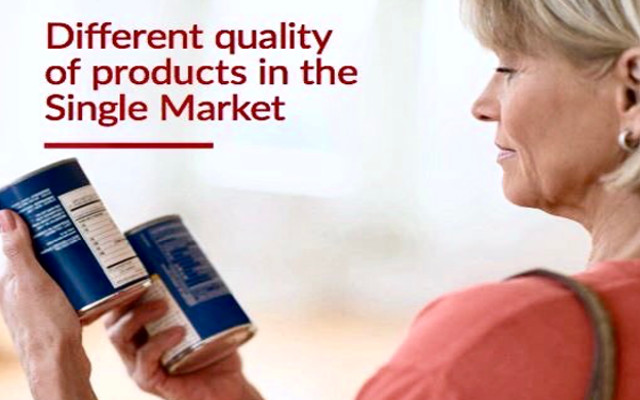European Commission President Jean-Claude Juncker has finally decided to take a stance against so-called Dual Quality Foods. That is, reputable food products that are presented in identical ways yet turn out to be of different, often inferior, quality in versions destined for some EU member countries.
Dual Quality Foods
The matter has been reported on several occasions over the past year by consumer associations and press organs in the former communist countries, so-called Visegrad Group. (1)
The difference in quality was mostly found on the products of the second industrial processing. Noting the lesser amount of the characterizing ingredients or the diversity of the ingredients. With inevitable variations, even significant ones, on the nutritional profiles of foods.

Surveys conducted on dozens of products with various reputable brands – traceable to
Big Food
(2) and other large industrial groups – have indeed confirmed the early clues gathered. Generating widespread discontent, in consumAtors in some Eastern European countries, whose echo reached Brussels.
Visegrad Group’s reactions
Hungary notified Brussels in May 2017 of a bill to give its official public oversight authorities specific investigative tasks. With the aim of shedding light on the phenomenon of dual quality foods and possibly prescribing appropriate label claims. (3)
Slovakia, the Czech Republic and Romania have in turn intervened in the debate, through their governments and MEPs (4) who sit in the Strasbourg Assembly.
Croatia and Slovenia recently joined the chorus of protests, following investigations that revealed differences in 85 percent of the products tested. Comparing foods sold locally with the corresponding products placed on the German and Austrian markets. (5)
The response of the European Commission
Commissioner Juncker, for once at least, (6) decided to disregard the expectations of the big industrial lobbies, and raise his voice against the Dual Quality Food phenomenon. A necessary response to increasing pressure from several member states, their representatives in the Europarliament, and consumer associations.
‘I will not accept that in some parts of Europe food products of lower quality than in other countries are marketed, despite the fact that the packaging and branding are identical. We need to give national authorities stronger powers to eliminate illegal practices where they exist.’
(Jean-Claude Juncker, president of the European Commission, 9/26/17)
The Single Market is often invoked by the European Commission to curb national food law initiatives. And so, in this Single Market, it is legitimate to expect consumers to be at least informed when the production of a well-known branded food is declined to one or more national territories with variations that affect the quantity and quality of ingredients, or nutritional profiles.
It is an ethical issue, the dark side of which has already been seen in terms of discriminating against Eastern Europeans as if they were ‘second-class’ consumers. There has even been talk of food apartheid. A strong expression, not to be underestimated.
Unfair business practices
From a legal point of view, the Dual Quality Foods issue is rather sensitive, as the industrial giants named in the lawsuit claim compliance with existing rules on consumer information related to food products. (7) Labels are consistent with the nature and characteristics of foods offered for sale, Big Food representatives say. Who at the same time deny, even beyond the pale, the different quality of products destined for Eastern Europe.
Therefore, the Commission presented a guideline document (8) that rests on the Unfair Commercial Practices Directive (UCPD). The Unfair Commercial Practices Directive, 2005/29/EC, provides the basis for synergistic work. That will have to involve member country authorities, in conjunction with the Commission and its Joint Research Center. Industry and branded product representations, which in turn will adopt an appropriate code of conduct. And consumer associations, such as AltroConsumo in Italy, coordinated at the European level by the BEUC Confederation.
‘Presenting two different products in the same brand packaging is misleading and unfair to consumers. This problem clearly shows that we can only solve cross-border problems if we work together at the EU level. For too long, individual member states have been unable to address this problem. I am determined to end this practice, which is prohibited under EU law, and to ensure that all consumers are treated fairly.’
(Věra Jourová, Commissioner for Justice, Consumers and Gender Equality).
The message is clear, the presentation of identically branded products that appear similar and yet turn out to be of different quality-in composition or organoleptic properties-can be an unfair trade practice. To be evaluated on a case-by-case basis (See flowchart below), with possible sanctioning outcome by Antitrust Authorities at national and EU levels.
The most serious risk for branded industrial giants remains that of name & shame. That is, public disclosure of unfair business practices that can undermine the reputations of industries, and cause the stock prices of listed industries to plummet.
Word to the wise, few words!
Dario Dongo
Notes
(1) The Visegrad Group consists of Poland, the Czech Republic, Slovakia and Hungary.
(2) Ferrero, too, has been quoted in various articles, most recently also in the Financial Times
(3) The so-called standstill period, i.e., the period of suspension of thelegislative process imposed by Brussels following the notification of the Hungarian bill, has been extended to 20.11.17
(4) We refer in particular to the written question submitted by MEPs Daciana Octavia Sârbu (Romania) and Pavel Poc (Czech Republic)
(5) With differences in product composition in 60% of cases. V. http://mobile.foodnavigator.com/Policy/Croatian-survey-Dual-quality-and-price-affects-85-of-sampled-products
(6) One is reminded of the inaction of the Brussels executive on such important dossiers as the indication of origin of food (see. penultimate paragraph article https://www.greatitalianfoodtrade.it/ceta-lautunno-della-democrazia) and on the management of food safety risk related to palm oil
(7) See EU Regulation 1169/11.
(8) SEE http://ec.europa.eu/newsroom/document.cfm?doc_id=47227
Dario Dongo, lawyer and journalist, PhD in international food law, founder of WIISE (FARE - GIFT - Food Times) and Égalité.





